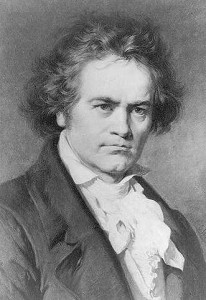 I have had the opportunity to play Beethoven’s Ninth Symphony on several occasions now between my work in New York and Philadelphia. This past week I played four concerts of this great work. One of the most stunning things to me about the experience of playing it is that, without fail, the houses are nearly always full or sold out. People show up in droves to hear it – and they are an exuberant bunch! You get the feeling that this is an Event – definitely with a capital “E” and probably with an exclamation point!
I have had the opportunity to play Beethoven’s Ninth Symphony on several occasions now between my work in New York and Philadelphia. This past week I played four concerts of this great work. One of the most stunning things to me about the experience of playing it is that, without fail, the houses are nearly always full or sold out. People show up in droves to hear it – and they are an exuberant bunch! You get the feeling that this is an Event – definitely with a capital “E” and probably with an exclamation point!
This past week I played assistant horn on the piece (which means I only play when the principal horn needs assistance) so I had some extra time to look out into the row upon row of attentive audience members – all the way up to the top tiers – and contemplate what it is about this work that thrills people. For sure, part of it is the presence of the large chorus on stage. Choruses often bring along with them cheering entourages of family and friends who come out for the event. This is one thing I love about singers and those who love singers – the enthusiasm and support! But that still only accounts for a very small part of the audience.
Another part of the equation is the very famous “Ode to Joy” in the last movement. It is so famous that we hear it ad nauseum in truncated form all the time in daily life – even in commercials. I think people like the idea of hearing it in its original form and context – from the source!
Another likely factor is the sheer size of the work – both in numbers on the stage and in the length of the piece. These massive, monumental works really do have the feeling of being a special event and people respond to that.
However, I think there is something more to it than that. If you will allow me to digress a little…
A dear friend of mine recently asked me what I would write if I were gearing a blog post towards young students who have no professional musical aspirations – for someone in, say, middle school or early high school who is simply interested in deepening their musical knowledge and experience. I have been contemplating this, and, although I could come up with more specific ways to guide their curiosity (so I might write more about those thoughts later), I feel like so much of the larger content of advice I have for them would be very similar to what I would say to someone with professional aspirations. Give life your all! Delve deeply into whatever you choose to delve into!
It is my belief that one of the biggest challenges for a young person growing up today is to live in a committed, deep way. With technology making information so readily available, it is very easy to live flittingly. One can learn a little about a lot of things – and there are certainly some advantages to that. But having unlimited quantities of information and distractions at your fingertips – infinite choices of where to place your attention – makes for a potentially overwhelming environment and means that a young person must have that much more self-discipline to experience life in a non-shallow way.
I can think of very few things in life that enrich a person like making a commitment to something that is not absolutely required of them – something not required for graduation or to get into a good college, or later in life, to make ends meet. There is something about the act of commitment that, not only brings out the best in you, but that also seems to summon unforeseen forces to help you out in your endeavors along the way. A path can open up in front of you that you couldn’t have imagined before. It completely changes the experience – it deepens and broadens it. And it gives back to you what give to it.
 I was recently talking with my mother about commitment. She and my dad, as music teachers, have seen a decline over the years in commitment of students to be a reliable part of band and chorus. What’s more is that sometimes the parents don’t even encourage and support an attitude of commitment from their child. Showing up for and prioritizing an activity seem the exception rather than the rule. Things happen of course – people get sick (as I write this I’m unexpectedly at home sick when I was supposed to be in New York), but this is less about the bumps that keep us away from time to time and more about the daily attitude of showing up and being fully engaged in certain endeavors.
I was recently talking with my mother about commitment. She and my dad, as music teachers, have seen a decline over the years in commitment of students to be a reliable part of band and chorus. What’s more is that sometimes the parents don’t even encourage and support an attitude of commitment from their child. Showing up for and prioritizing an activity seem the exception rather than the rule. Things happen of course – people get sick (as I write this I’m unexpectedly at home sick when I was supposed to be in New York), but this is less about the bumps that keep us away from time to time and more about the daily attitude of showing up and being fully engaged in certain endeavors.
What commitment does is lead to an experience of a broader journey – of learning about yourself, of learning how to be a part of something greater than the individual, it deepens relationships with those who are also committed with you, it heightens the culminating experiences because you have been in it together all along the way. You’ve shown up, you’ve toiled together, and you’ve worked through various experiences both good and bad. It is a shared journey. And when you are sharing a path with someone, or a group of people, when you have been through something together, the burdens are shared and the joys are multiplied.
This is starting to sound a little like going to the orchestra to hear Beethoven’s 9th Symphony, isn’t it?
 There is A LOT of music to be heard before that last joyful shout. The emotional impact of the last movement is only really possible because of the context. Hearing that melody in a commercial, or singing it as a hymn in church may be all well and good, but it just doesn’t match the joy felt in the real thing. The audience has been on a journey with the orchestra and chorus for a full hour or so already – they showed up and committed to the whole darn thing. The storminess of the first movement, the quirky dances of the second, the reminisces and ruminations of the third movement, and exhaustive (and exhausting!) repetition and re-working of themes in all movements – this is what makes the drama and joy possible in the end. Beethoven gives back to you in equal measure what you give to him. Your time and attention do not go unrewarded!
There is A LOT of music to be heard before that last joyful shout. The emotional impact of the last movement is only really possible because of the context. Hearing that melody in a commercial, or singing it as a hymn in church may be all well and good, but it just doesn’t match the joy felt in the real thing. The audience has been on a journey with the orchestra and chorus for a full hour or so already – they showed up and committed to the whole darn thing. The storminess of the first movement, the quirky dances of the second, the reminisces and ruminations of the third movement, and exhaustive (and exhausting!) repetition and re-working of themes in all movements – this is what makes the drama and joy possible in the end. Beethoven gives back to you in equal measure what you give to him. Your time and attention do not go unrewarded!
It has to be said that my favorite part of the whole piece isn’t the joyful shout, though that is exhilarating. My favorite part is in the last movement, a relatively short passage, after you’ve heard “Ode to Joy” but before one of the last big pushes to the end. (There is always more than one big push to the end in Beethoven!) It is marked divoto. It is a tender, transcendent passage that to me has a sort of paired-down renaissance quality. It is sheer beauty and genius in my opinion – intimate and awe-filled at the same time, devoted, and full of faith and gratitude.
This is another by-product of living in a committed, deep way: gratitude! There is so much to learn and experience – we must come to grips with the fact that we will never know or experience everything, no matter how much curiosity or time we have to soak things up. We are human beings and not limitless. But through commitment to something larger than ourselves we can expand and experience life in ways simply not possible otherwise. We can journey through life together with those we make commitments to, experiencing valleys and peaks and everything in between. That’s not to say that life doesn’t change. If there’s one thing that is a constant in life, it is change, and we all have to learn to be flexible and ride the waves of change. But in the meantime, if we can approach with commitment some well-chosen things to which we are going to devote ourselves, the experience of life changes dramatically and very naturally leads to an underlying joy and a feeling of the deepest gratitude for life and for the things that connect us.
So, next time Beethoven’s Ninth Symphony is being played in your area, join the crowds! Get ready to settle in for a journey that you very likely won’t be sorry you experienced.

11 Responses to Beethoven’s Ninth Symphony and You: Commitment, the Journey, and Joy